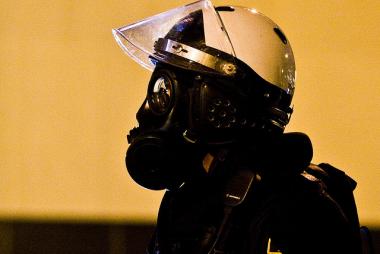The New York Police Department punishes people who exercise their First Amendment rights to free speech and press, including filming police, an....Occupy Wall Street organizer claims in a new federal lawsuit.
Police arrested Marisa Holmes on September 24, 2011, on charges of impeding “pepper-spray cop” Anthony Bologna’s arrest of Robert Stephens. Holmes was also charged with disorderly conduct. Prosecutors dropped the obstruction of governmental administration charge in April 2012. The Manhattan district attorney gave Holmes a “conditional dismissal” for the resisting arrest and disorderly conduct charges. A graduate student, she accepted the deal so she wouldn’t miss classes, she told the New York Daily News at the time.
Holmes counters that she was arrested for filming Bologna’s arrest of Stephens. Though police contend that she “kicked and flailed her arms,” according to the News, “video of the event shows the small-framed Holmes—weighed down by a heavy backpack—remaining still.” Holmes also argues that the DA dismissed the obstruction charge to keep Bologna off the stand.
The lawsuit, filed on July 14 in U.S. District Court for the Southern District of New York, alleges the arrest violated Holmes’s First, Fourth and 14th Amendment rights: freedom of speech and press, protection against unlawful search and seizure, and due process, respectively.
Jeffrey A. Rothman, who is representing Holmes, tells Newsweek the suit seeks redress for the “unconscionable violation” of these rights and “retaliation that she suffered simply trying to film police activity for her work as a journalist.”
The suit follows another recently filed federal lawsuit in Manhattan involving “arrests of people who recorded police confrontations or activity,” according to The New York Times. Lawyers for the plaintiffs in this suit have asked “a judge to declare that people have a right under the First Amendment to film or record officers working in public places...and seeks a permanent injunction barring New York City employees from retaliating against those who record them in public.”
Lower courts elsewhere in the country have ruled that people do have the constitutional right to record police, but a New York court has not ruled on the issue, according to the Times.
Holmes is suing the City of New York and Deputy Inspector Bologna, Detective Kenneth O’Donnell, Officer Fernando Centenotalavera and Richard Roes, as well as several unnamed officers, the identity of whom is still unknown.
In her filing, she says the problems started when Stephens gave “an oration condemning Chase Bank” near 1 Chase Manhattan Plaza shortly before 1 p.m. on September 24, 2011.
Holmes claims that many members of the public and press corps were present during that demonstration and that many were recording the proceedings. Police “said nothing to ask any members or the public or journalists to get out of the roadway,” she says in the filing.
Bologna arrested Stephens, and Holmes moved from the road to the sidewalk to film the arrest. O’Donnell then told Holmes to leave and “asked her if she wanted to be arrested and interfered with her attempt to film the man being arrested,” according to the filing. O’Donnell and Centenotalavera then grabbed Holmes, arrested her and “took [her] roughly down to the ground, causing her to land on top of her large equipment bag.” Holmes claims she was already leaving the area. She also claims that when Bologna, O’Donnell and Centenotalavera put her in handcuffs, they did so “with an excessive and punitive tightness.”
Holmes maintains the arrest hinges entirely on her filming police activity and “intentionally, maliciously, and with a deliberate indifference to or a reckless disregard for the natural and probable consequences of their acts, caused injury and damage in violation of plaintiff’s constitutional rights.” Holmes’s suit says the NYPD has “de facto policies, customs and usages which were a direct and proximate cause of the unconstitutional conduct.”
That is, the NYPD has an unwritten rule to arrest people who exercise free speech “in a manner that affronts police officers or is interpreted by police officers as challenging their authority or documenting or reporting their misconduct, including filming them,” the filing states.
The suit further alleges that the NYPD has similar policies “sanctioning the cover-up” of police misconduct, including “the fabrication of false accounts and evidence and/or through the ‘blue wall of silence.’”
The lawsuit argues that past and pending cases, including multiple suits alleging false arrests of Occupy Wall Street members, make clear that the NYPD has a policy in violation of constitutional rights.
The New York City Law Department tells Newsweek, “We will review the allegations in the complaint.”


